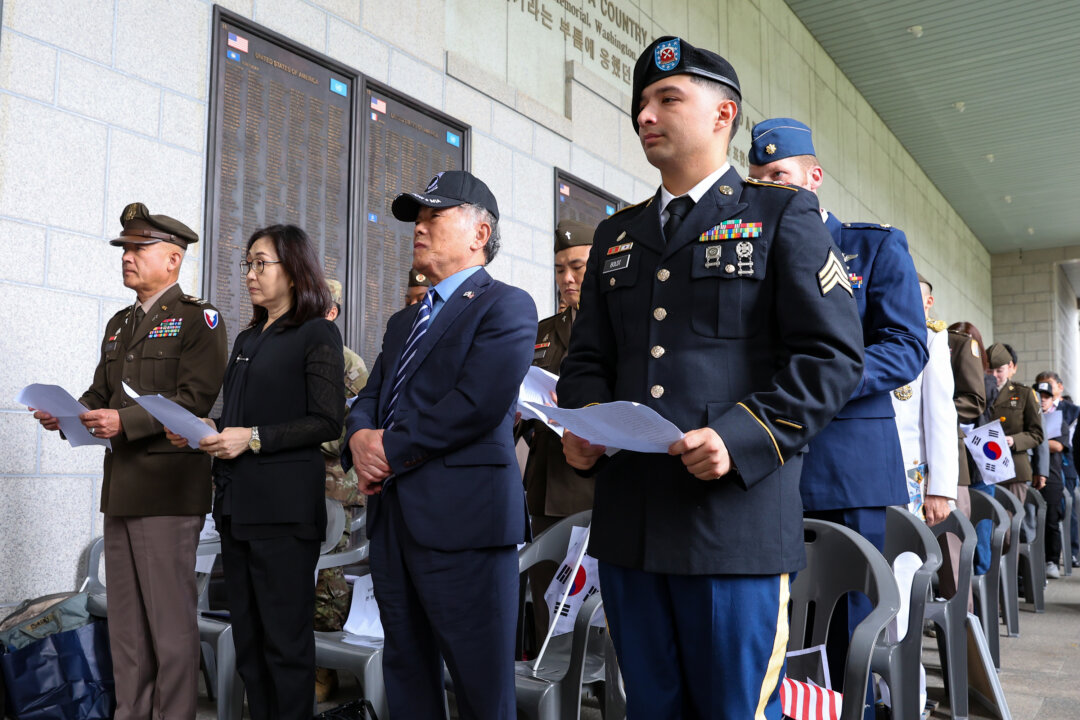SEOUL, South Korea—South Korea hosted the first joint Korean War POW/MIA Recognition Day with the United States in Seoul on Sept. 21. The event honored American soldiers who were prisoners of war (POWs) or went missing in action (MIA) during the Korean War.
Since 1979, POW/MIA Recognition Day has been observed in the United States and worldwide on the third Friday of September. More than 80,000 American soldiers have never made it home, including more than 7,000 from the Korean War.
The Sept. 21 event, the first of its kind in South Korea, was held when the military alliance between the two nations was strengthening.
The ceremony was organized by Remember Together 7697, a group named after the 7,697 U.S. soldiers still unaccounted for at the time of its founding in 2018. While 232 sets of remains have been repatriated over the past six years, more than 7,400 soldiers remain missing, with around 5,300 believed to be in North Korea.
Chae Woo-seok, chairman of the Korea Defense Industry Association, highlighted the role of U.S. soldiers in helping South Korea rebuild after the war. In a gesture of appreciation, he presented a book on the history of South Korea’s defense industry to the U.S. soldiers stationed in South Korea.
“Through this book, you will see how Korea, once without even a single rifle, has grown to the point of exporting self-propelled guns, tanks, and submarines. I hope this allows you to take pride in the role you played in the development of the Republic of Korea,” he said.
As a token of gratitude, the U.S. side presented a folded American flag to Han Jung-yoon, chairman of Remember Together 7697, and another was given to be delivered to South Korean President Yoon Suk Yeol. The event concluded with participants laying flowers at the memorial for fallen soldiers.


The ceremony also displayed the “Missing Man Table,” a symbolic tribute to both the fallen and those still unaccounted for. According to U.S. Army Chaplain Chan Ham, each item on the table carried meaning.
A white tablecloth symbolized the soldiers’ pure intentions in answering the call to serve. The single red rose represented the soldiers’ lives and the loved ones who continue to wait for their return. A yellow ribbon stood for the hope that they may still come home.
Other items included a slice of lemon, representing the bitterness of their fate, either captured or missing in a foreign land. The salt signified the tears shed by their loved ones. A lit candle symbolized the hope for their return, and the Bible represented the strength found through faith by those left behind. The inverted glass indicated they were no longer present to share a toast, and the empty chair signified their absence.

“Our country will never forget you, and it will never abandon you,” U.S. Army Chaplain Martin Cho said in a memorial prayer.
Hwang Il-woong, vice president of the Korean American Veterans Association, read a letter from the National League of POW/MIA Families.
“They did not fight for recognition but for the ideals of freedom and justice. Although their bodies were never found, their spirits are woven into the fabric of the alliance between our two countries, and their sacrifice became the foundation of the prosperity we enjoy today,” he said.
Attendees each read aloud 100 fallen service members’ names, honoring all of the 7,697 missing in the Korean War.

